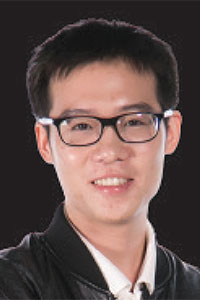What do you think when someone says those who are not loyal to the monarchy hate the nation?
It is the first question that appears in a viral exam for high school students. Unimaginable in my day, it heralds a positive change in the Thai education system that lags behind social and political change in the country that has seen a tug of war between conservative and progressive forces for almost a century.
It sparked off debate when Kaokorn Suksa-ngiamkul, a teacher at Mathayom Wat Thatthong School, posted a photo of the final exam paper for Mathayom 6 (grade 12) students on his Facebook account. He said students can pick any topic and a classroom must provide a safe platform for academic discussion.
Other questions offer different hypothetical situations. If they were asked to give a speech in the United Nations General Assembly, what would they address to the international community? If their parents were politicians found guilty of corruption, how would they explain it to the public and solve the dilemma? Does an alcohol ban on Buddhist holidays infringe on the rights of followers of other religions?
Students are asked to answer two out of four questions. The test says clearly it will assess their substantiated views. In cases of plagiarism, they will receive a grade of zero.
Approved by the school director, the teacher replaced civil duties with contemporary issues under social studies. He said essay questions are based on what students already discussed in class. Some even asked for additional answer sheets. However, some netizens doubted whether his political stance will affect grading students who may be on other end of the ideological spectrum.
"There is no right or wrong answer. If students complete the essay, they will get full scores," he told local media.
The controversial test is a case in point for a seismic change in our society. The young generation, including teachers and students, are evolving in terms of how they view the nation. Popular nationalism differs from the long-held idea of the king-centred nation and opens up other aspects that are not widely discussed in Thai history classes. One of them is the role of commoners in nation-building.
The nature of the exam demonstrates that the idea of nation is not essential and static, but socially constructed and subject to debate. The mainstream version of nationalism is centred on nation, religion and king. It dates back to the reign of King Chulalongkorn (1868-1910), who replaced the old political order with the model of the nation-state. From the 1860s onwards, colonial pressure intensified. Siam escaped it partly because they embraced the idea of progress.
During his 42-year rule, King Chulalongkorn campaigned for modernisation. When he was young, he travelled to see progress in colonial territories. In his regency, he launched a centralised bureaucratic administration, abolished slavery, introduced military conscription, implemented judicial reform, and above all Westernised the monarchy. It opened up to the West and became more public.
Still, King Chulalongkorn argued that Siam's political tradition was different. He stressed the importance of chat (nation) and samakkhi (unity). In 1904, he said the king was the embodiment of the nation. It continued into the reign of King Vajiravudh (Rama VI), who called for the Siamese to unite in defence of the nation, religion and king, amid growing rejection of absolutism.
But there are other definitions of nation, which do not translate into nation hatred. People in the early 20th century challenged the idea of the king-centred nation. A public sphere emerging in the late 19th century enabled writers and readers to imagine stories of ordinary people via newspapers, translations of Western novels and cinema. Journalism developed in this context, providing a platform for the king and journalists to engage in debate.
Eventually, in 1932, the Khana Ratsadon (People's Party) staged a coup, marking a transition from absolute to constitutional monarchy. In fact, the government found a plot by junior military officers from commoner backgrounds to overthrow absolute monarchy as early as 1912. As nearly a century goes by, struggle between the older order and the new force still ensues.
Some students may even delve into Siam's practice of internal colonialism whereby officials were sent to rule frontier states. But there was opposition and revolt in the periphery, for example Isan and Lanna, which wanted to assert their own independence.
Debate on the idea of the nation can be seen as part of the current trend to distance from the king-centred version of nationalism. In the aftermath of the dissolution of the Future Forward Party, flash mobs gradually developed into the Ratsadon Movement of 2020. Early this year, a group of university students launched the 1932 People Space Library at Wat Thong Noppakhun. Thammasat Secondary School also came under the spotlight for the way it teaches history critically.
These efforts mark a dramatic departure from my days. I grew up with multiple-choice exams that leave no room for debate and even disagreement with examiners. If they are poorly designed, there will be no answer at all. I remember a national entrance exam that once asked what students should do if they have sexual desire. According to the test developer, the answer by the book is that they should play football with friends. Other choices could not be more ridiculous.
As Vladimir Lenin said: "There are decades where nothing happens; and there are weeks where decades happen."
Thana Boonlert is a feature writer for the Life section of the Bangkok Post.
